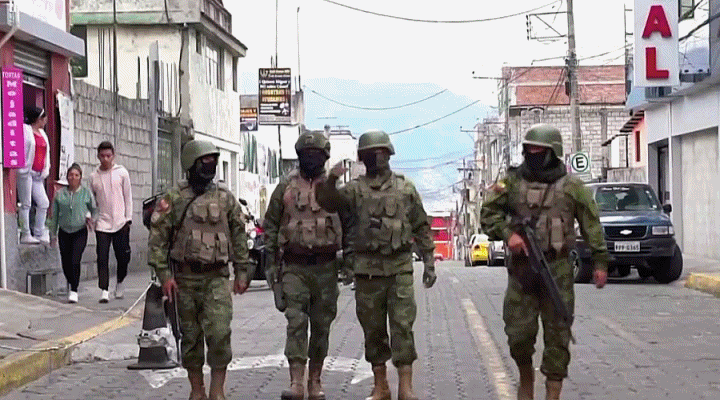
On January 9, a new threshold of terror was crossed in Ecuador with the assault live on public television TC by heavily armed and hooded men. These attackers briefly took journalists and channel employees hostage before the police intervened, freeing the hostages and arresting 13 attackers. Eight days later, anti-mafia prosecutor Cesar Suarez, responsible for investigating this spectacular attack, was assassinated in broad daylight in the center of Guayaquil.
An attempted assault on a hospital: 68 arrests
Faced with this escalation of violence, President Daniel Noboa declared a state of emergency and described the country as having an "internal war" against gangs, calling them "terrorists". More than 20,000 soldiers have been deployed on the ground. On Sunday, new violent incidents broke out in Guayas, in the southwest.
In response to this critical situation, Ecuadorian police made 68 arrests during an attempted assault on a hospital in Yaguachi, Guayas province. These alleged members of a criminal organization planned to take control of the installations to protect one of their own, injured and hospitalized in the morning. Law enforcement also seized guns and drugs, uncovering a clandestine rehabilitation center where members of the organization were hiding.
This intervention takes place in the context of a recent general insurrection by many drug trafficking criminals following the escape of the main gang leader from an Ecuadorian prison. The authorities also closed several clandestine rehabilitation centers, presented as hospitals, but run by gangs without adequate medical equipment. On Sunday, around 10 tons of drugs were seized near the town of Vinces, in the province of Los Rios, by the army.
Seizure of guns and drugs
At the same time, the police made a seizure of firearms and drugs, uncovering a clandestine “re-education center” where suspected members of the organization were hiding, according to information provided by the authorities. These illegal centers have been the subject of recent closures by the authorities, mainly establishments presented as clandestine hospitals run by gangs. According to the authorities, these structures are not equipped with the medical devices necessary to ensure adequate care for patients.
Furthermore, on Sunday, in the province of Los Rios, near the town of Vinces, the army reported the seizure of around 10 tons of drugs. This action strengthens the authorities' efforts to counter drug trafficking and dismantle criminal networks operating in the western region of Ecuador.
“Andean Security Network”
On January 21, an emergency meeting was held in Lima, the capital of Peru, bringing together member countries of the Andean Community of Nations (CAN), to discuss the critical situation in Ecuador. The country is currently undermined by violence linked to drug trafficking, generating unprecedented chaos and security crisis. Neighboring countries members of the Andean Community have expressed concern about this rapid deterioration of the situation in Ecuador.
These nations, namely Colombia, Peru, Bolivia and Ecuador, are uniting to define concerted actions against the proliferation and expansion of gangs involved in drug trafficking and racketeering. The international ramifications of these criminal groups have put border areas on alert, requiring a coordinated response.
The head of the Peruvian government, Alberto Otarola, underlines the imperative for concerted action in the face of this reality, affirming that no country is truly safe if its neighbor is under the senseless assault of these groups. The meeting, convened by the Bolivian rotating presidency, was an opportunity to strengthen regional cooperation to counter this growing threat.
At the end of the summit, the Ministers of Foreign Affairs, Interior and Defense of Colombia, Peru, Bolivia and Ecuador announced the creation of the first "Andean Security Network" against organized crime. This network will provide a 24/7 operational service, enabling the exchange of information between member countries on the activity of criminal groups operating transnationally.
Twenty gangs rule the roost
The expansion of gangs involved in drug trafficking and racketeering in Ecuador has sparked alarm at the borders, prompting Peru and Colombia to strengthen their controls, fearing the arrival of criminals fleeing growing repression in Ecuador.
Despite its reputation as a relatively safe country, Ecuador has experienced an escalation of violence over the past five years, accentuated by an economic slowdown and deterioration following the Covid-19 pandemic. The homicide rate has exploded, going from 6 to 46 per 100,000 inhabitants in 2023.
Historically protected from violence linked to drug trafficking, Ecuador, located between Colombia and Peru, the two main world producers of cocaine, is now an operational and logistics center for shipping this drug to Europe.
Around twenty gangs, sometimes acting from prisons, exercise worrying control over the situation.
In a report published in 2022, the Inter-American Commission on Human Rights (IACHR) highlighted the “significant internal control” exercised by the head of Los Choneros over the prison. She also noted that the latter, as well as Junior Roldan, another leader of the gang killed last year in Colombia, benefited from “differential and preferential treatment from the authorities”.
|
|





